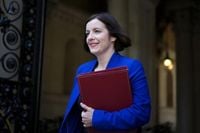On June 30, 2025, Education Secretary Bridget Phillipson issued a heartfelt call for Britons to consider having more children and to start families earlier, warning of the serious consequences posed by the country’s declining birth rates. Speaking candidly about the challenges faced by young people today, Phillipson highlighted the “worrying repercussions” of the drop in fertility, which she described as a “heartbreaking” reflection of the dashed dreams of many families.
Official figures reveal that fertility rates in England and Wales fell to 1.44 children per woman in 2023, the lowest level since records began in 1938. This rate is well below the replacement level of approximately 2.1 children per woman, which is needed to maintain a stable population. The number of babies born last year was the lowest since 1977, underscoring the steep decline that has unfolded over recent decades. In fact, over the past 15 years, the UK’s overall fertility rate has dropped by nearly 27%, meaning for every two women of childbearing age, one less child is being born.
Phillipson told The Independent that the UK faces “a big challenge with the very steep decline that we're seeing in the birth rate.” She explained that many people’s decisions about when and whether to have children are constrained by factors like “the cost of childcare, housing costs, instability at work.” These economic pressures, combined with changing social norms, have made starting a family a daunting prospect for many.
“A generation of young people have been thinking twice about starting a family, worried not only about rising mortgage and rent repayments, wary not only of the price of fuel and food but also put off by a childcare system simultaneously lacking in places and ruinously expensive,” Phillipson said, acknowledging the multifaceted nature of the problem.
Her comments mark a significant shift in the government’s rhetoric. Last year, Labour leader Sir Keir Starmer had said it was not his place to tell people how many children to have. However, a Downing Street spokesperson insisted there was no change in the official position, emphasizing that “having children is a personal choice and that is entirely consistent with the prime minister’s language.” The spokesperson added that the government’s focus remains on “delivering for working people through the plan for change” and “raising living standards.”
Phillipson’s appeal is not without precedent. European leaders, including French President Emmanuel Macron, have taken steps to encourage earlier childbearing—Macron introduced free fertility checks for 18 to 25-year-olds to help people plan their families. Similarly, political figures like Nigel Farage have called for an “180-degree shift” in attitudes toward having children, urging parents to start families earlier and have more children.
To help ease the financial burden on families, the government has expanded access to funded childcare. Since May 2025, working parents of children who turn nine months old before September 1 have been able to apply for up to 30 hours of free childcare per week until their child starts school. This expansion builds on a rollout that began in April 2024, initially targeting working parents of two-year-olds. Currently, parents of children older than nine months can access 15 hours of funded childcare weekly, with the full 30-hour entitlement being phased in for all eligible families by September 2025.
Phillipson told the Daily Mail in June that this childcare support gives parents “the freedom to think about family size and how many children they want to have.” She emphasized that parents will be able to make choices about their careers, working hours, and family planning with greater confidence thanks to these government measures.
Further bolstering support for families, the Labour government announced plans to open approximately 200 new or expanded school-based nurseries across England from September 2025, providing up to 4,000 childcare places for children under school age. This number is expected to grow to 300 nurseries later in the school year. Other initiatives include free breakfast clubs, increased free childcare hours, expanded free school meals, and a cap on school uniform costs—all designed to reduce the financial strain on families.
Phillipson contrasted these comprehensive family-friendly policies with what she described as “back-of-a-fag-packet solutions” proposed by groups like Reform UK, which have suggested abolishing the two-child benefit limit and offering tax breaks. She argued these ideas “crumble under the slightest scrutiny,” implying that meaningful support requires more thoughtful, well-funded measures.
Health Secretary Wes Streeting has echoed concerns about the demographic challenges posed by declining birth rates. He warned that the trend presents “long-term demographic challenges for our country” but also highlighted the deeper human aspect, saying, “beyond the hard-headed economics, there is also the joy and love and wonder of parents being able to have children.”
Phillipson’s vision is clear: she wants more young people to have children, but only “if they so choose.” Her message is about expanding freedom and opportunity, not pressuring families. In an article for the Daily Telegraph, she wrote, “I have always believed that politics is about giving everyone, particularly the most disadvantaged in our country, the freedom to choose their own path in life.” She hopes that by improving childcare access, tackling housing and cost-of-living pressures, and stabilizing work conditions, more people will feel able to realize “the ordinary aspiration so many share, to create the moments and memories that make our lives fulfilling: having children, seeing them take their first steps, dropping them off at their first day at school, guiding them on their journey into the world of work or taking them to university for the first time.”
As Britain grapples with the implications of its falling birth rate, Phillipson’s call underscores a broader societal challenge. It’s not just about numbers; it’s about ensuring that families have the support, security, and freedom to make choices that shape their futures. Whether these new policies will reverse the trend remains to be seen, but the government’s commitment to expanding childcare and addressing economic barriers signals a recognition that the nation’s demographic health depends on more than just statistics—it depends on the lived experiences and dreams of its people.


